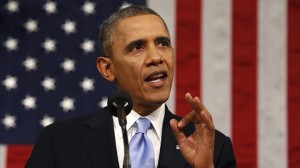 An Iranian diplomat argues that the repeated threats of war against Iran in the official US vernacular are�harmful to delicate, ongoing nuclear negotiations and undermine the rule of international law.
An Iranian diplomat argues that the repeated threats of war against Iran in the official US vernacular are�harmful to delicate, ongoing nuclear negotiations and undermine the rule of international law.President Obama in his State of the Union address alluded to the availability of �all options� in dealing with Iran's nuclear program despite his expressed eagerness for the diplomatic process. Also, in his recent interview with Al-Arabiya, US Secretary of State John Kerry threatened US military action against Iran if the current negotiation process fails., Such negative comments are bound to have certain short- and long-term side-effects, especially in light of Iran�s seriousness in resolving the current (and unnecessary) crisis over its peaceful nuclear program.
One of the most important changes that led to the �Joint Plan of Action� temporary agreement between Iran and the P5+1 powers in Geneva in November was the common interest of the parties to establish and sustain a positive momentum in negotiations, instead of applying the previous bargaining techniques. They also focused on cross-linkage of issues and outlining a sequence of steps within an acceptable framework to both sides. Following through on those steps to reach a permanent agreement will require avoiding any action or rhetoric that harms the diplomatic process and undermines the new momentum.
ONE MINUTE DEBATE:�3 views on the Iran nuclear deal
In his inaugural speech last August, President Hassan Rouhani stated that the way forward in dealing with Iran and keeping the diplomatic momentum is by maintaining mutual respect and using the �language of reverence� and refraining from using �the threat of war and sanctions.�
Opinion forms speech and speech forms behavior. So the new Iranian president has paid special attention to the power of words in creating peace and tranquility in the region, and to complementing that with constructive actions. In this connection, Mr. Rouhani also initiated a �World Against violence and Extremism� resolution that was approved by the UN General Assembly by consensus of all member states, including the United States.
At the recent Davos Forum, Rouhani again invoked the language and discourse of amity and moderation in global affairs, and expressed Iran�s eagerness to improve relations with all countries. Matching words with action, Iran has faithfully implemented its commitments under the Geneva agreement, and is prepared for the next round of negotiations in the near future.
It is therefore reasonable to expect others to reciprocate and use the right vocabulary in tandem with the spirit of ongoing negotiations. Unfortunately, the repeated use of the threat of war in the official US vernacular can have adverse long-term consequences. It can, for example widen the chasm between rhetoric and reality, making it more likely that certain past mistakes will be repeated.
Case in point is the US�s post-9/11 misuse of the term �pre-emptive war,� which led to the catastrophic invasion of Iraq in 2003. The US failure to reconsider its interpretation of this dangerous concept, rejected by most nations in the world today, is an issue that deserves serious attention. Lest we forget, it was also the basis for Israel�s illegal actions in the Middle East, particularly after the 1967 war, adding to the false narrative that gave a conceptual cover for the 2003 invasion. As a result, today the international community is extra-sensitive about the correlation between political rhetoric and policy.
Also, the official verbal threats against Iran are in direct violation of the UN Charter, Article 2 (4), which expressly forbids member states from resorting to the threat of force against one another. In other words, in addition to being harmful to the delicate nuclear negotiations, such threats undermine the rule of international law and are, conceptually speaking, conducive to global anarchy. In fact, as far as Iran is concerned, the interim Geneva agreement and the upcoming final status negotiations present a litmus test of a new American diplomacy based on mutual respect.
ANOTHER VIEW:�Iran deal validates nuclear blackmail and hurts Israeli-Palestinian peace process
Building bridges over the chasm between nations is Iran�s top priority, and clearly this requires more than a fragmentary echo by others. Otherwise, the chasm of words will be a dangerous cliff to overcome in future talks.�Confidence-building is a two-way road and necessitates genuine US efforts based on language aimed at gaining the trust of Iranian nation.
By The Christian Science Monitor
The Iran Project is not responsible for the content of quoted articles.










